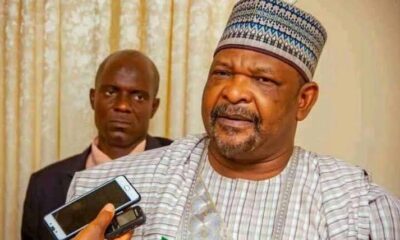- 2018 Budget: FG Records N1.1tn Deficit in Eight Months
Between January and August, the Federal Government recorded a fiscal deficit of N1.14tn in its operations, figures obtained from the Budget Office of the Federation have revealed.
The 2018 budget which was signed by President Muhammadu Buhari had a total spending of N9.1tn made up of N2.87tn for capital expenditure, N3.51tn for recurrent (non-debt) expenditure while N2.01tn was projected to be spent on debt servicing.
The N9.1tn budget was expected to be financed from N2.99tn to be generated from oil revenue, N31.25bn from Nigeria Liquefied Natural Gas dividend while N1.17bn is expected to be realised through revenue from minerals and mining.
To fund the budget, the Federal Government had planned to generate N658.55bn from Companies Income Tax; N207.51bn from Value Added Tax; N324.86bn from Customs while N57.87bn was expected to come from federation account levies.
The government was expected to raise N847.95bn through independent revenue from its agencies, while tax amnesty income, signature bonus and unspent balance from previous years were to provide N87.84bn, N114.3bn and N250bn respectively
Details of the performance of the 2018 budget which was captured in the 2019 Budget Call Circular showed that as of the end of August, the Federal Government’s actual revenue was N2.48tn.
The budget circular, which was signed by the Minister of Budget and National Planning, Senator Udo Udoma, noted that the N2.48tn actual revenue represented about 52 per cent of the N4.78tn pro-rata budget.
It attributed the shortfall of 48 per to the underperformance of both oil and non-oil revenue sources.
The circular said, “The shortfall in Companies Income Tax collections may be partly due to seasonal factors as most companies remit their income taxes during the second half of the year.
“The slow recovery in economic activities that drive consumption and the lingering security issues contributed to the underperformance of other non-oil revenue sources like Value Added Tax.
“The delay in the implementation of other revenue initiatives like the restructuring of
JV (Joint Venture) oil assets and tighter performance management of Government Owned Enterprises further explain the weak non-oil revenue performance.”
In terms of expenditure, it said out of the total appropriation of N9.12trn, the sum of N3.64tn had been spent between January and August.
This, according to the document, represents a shortfall of about N2.44tn over the prorated expenditure sum of N6.08tn for January to August.
A breakdown of the N3.64tn showed that a total amount of N1.83tn had been released for non-debt recurrent expenditure for the payment of salaries, pensions, and overheads among others.
It said, “Releases for capital expenditure only commenced after the 2018 budget was signed into law on June 20, 2018.
“Revenue shortfalls and the need to meet non-discretionary recurrent spending such as payment of salaries and debt service further affected the level of capital expenditure in the period.
“A total of N486.29bn was released by October 17, 2018 for capital projects.
“In effect, a deficit of N1.14tn was incurred as at end of August 2018, which is about 58 per cent of the budgeted deficit for the full year.”
Similarly, the document stated that the sum of N1.54tn had been released to cover debt service obligations during the eight months period.
It said the N3.64tn released during the eight months period excluded the N486.29bn which was released to agencies of government on October 17for the execution of capital projects.

 Naira4 weeks ago
Naira4 weeks ago


 Naira4 weeks ago
Naira4 weeks ago


 Naira3 weeks ago
Naira3 weeks ago


 News4 weeks ago
News4 weeks ago
 Travel4 weeks ago
Travel4 weeks ago




 Naira4 weeks ago
Naira4 weeks ago


 Jobs3 weeks ago
Jobs3 weeks ago
 Naira3 weeks ago
Naira3 weeks ago




















